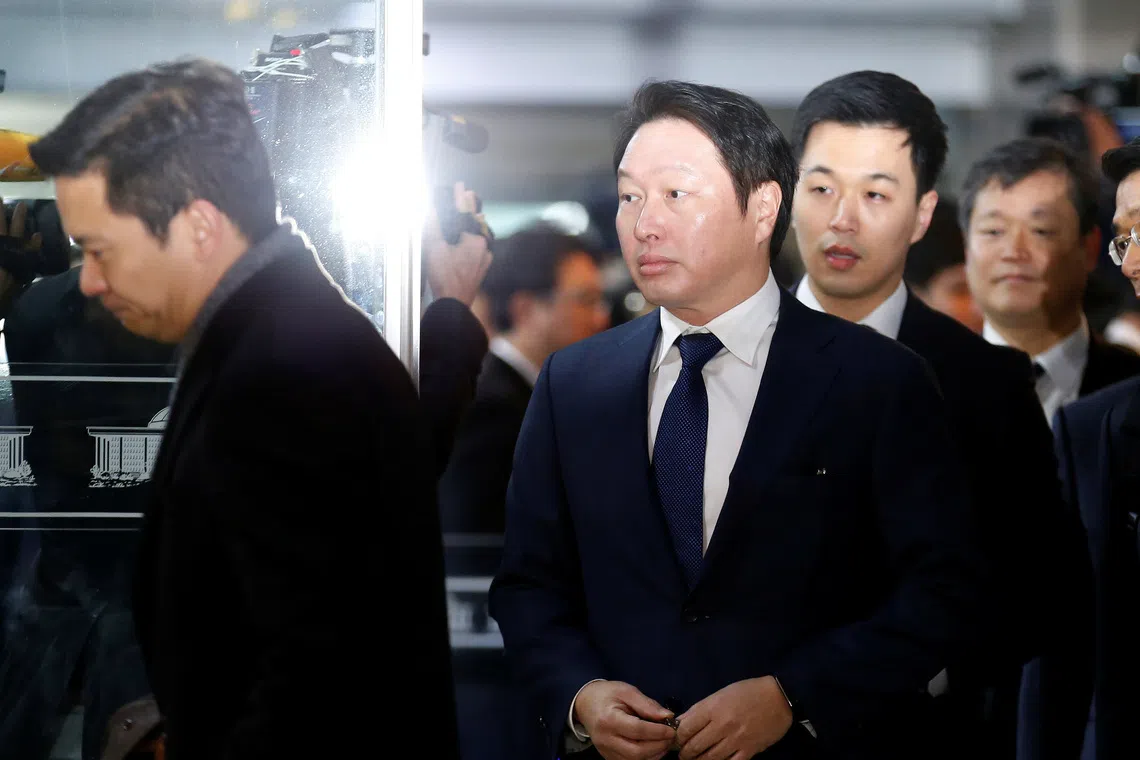South Korean high court partially overturns SK Group chairman’s near US$1b divorce settlement
Sign up now: Get ST's newsletters delivered to your inbox

SK Group Chairman Chey Tae-won got a temporary victory on Oct 16 after South Korea's Supreme Court sent his divorce case back to a lower court for review.
PHOTO: REUTERS
Follow topic:
SEOUL - South Korea's Supreme Court on Oct 16 sent SK Group Chairman Chey Tae-won's high-profile divorce case, which required him to pay a record settlement, back to a lower court for review, handing the billionaire businessman a temporary victory.
In 2024, the Seoul High Court said Mr Chey should pay 1.38 trillion won (S$1.3 billion) to his estranged wife, Ms Roh So-yeong, as part of their planned divorce. In addition to what would have been the country's largest divorce settlement, the Seoul High Court also ordered Mr Chey to pay Ms Roh 2 billion won in alimony. Mr Chey contested that court's order.
The Supreme Court kept in place the lower court's order covering the alimony payment of 2 billion won.
SK Group is South Korea's second-largest conglomerate with 363 trillion won in assets as of May 2025, according to data from the Korea Fair Trade Commission. Its affiliates include chipmaker SK Hynix.
SK Inc shares fell 5.4 per cent after the ruling on Oct 16.
Analysts said if the court ruling had been upheld, it could have prompted Mr Chey to raise funds by pledging SK shares as collateral - a move that would typically support the stock price.
In 2024, the Seoul High Court said Mr Chey's shares in holding company SK Inc should be considered part of the couple's joint property. Ms Roh is the daughter of former South Korean President Roh Tae-woo.
The court's ruling raised questions about how Mr Chey would raise the money, given that he was not believed to have easy access to such a large sum of cash as a large part of his net worth is invested in the shares of affiliated companies.
A possible sale of some of his holdings in SK Inc would have likely diminished his control of the holding company and SK Hynix.
The Seoul High Court, an appeals panel, had accepted Ms Roh's argument that her parents had provided a large amount of money to the Chey family that enabled them to finance the growth of the conglomerate.
In its ruling on Oct 16, the Supreme Court said the appeals court erred in its decision on the funds provided by Ms Roh's parents.
It said the 30 billion won was likely amassed by the former president from bribes that he received while in office. As a result, it said Ms Roh is not entitled to claim any assets that grew out of the funds that her father gave to the Cheys around 1991.
The Seoul High Court's decision in May 2024 overturned a 2022 ruling by a lower court for a much smaller amount. REUTERS

